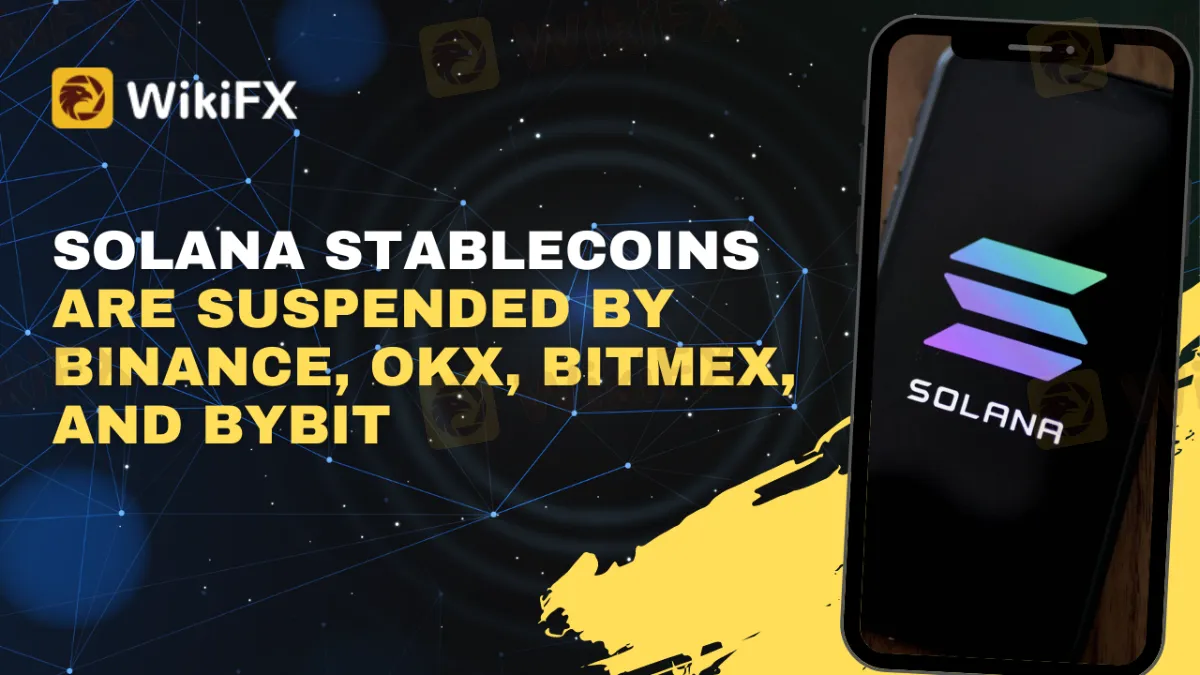简体中文
繁體中文
English
Pусский
日本語
ภาษาไทย
Tiếng Việt
Bahasa Indonesia
Español
हिन्दी
Filippiiniläinen
Français
Deutsch
Português
Türkçe
한국어
العربية
Solana Stablecoins Are Suspended By Binance, OKX, Bitmex, and Bybit
Abstract:At least five cryptocurrency exchanges told their customers today that the Solana network has stopped all deposits and withdrawals of Tether's USDT and Circle's USDC.

As the FTX problem continues to shake up the cryptocurrency world, big platforms like Binance, OKX, BitMex, and ByBit have said that the halt will start right away. The two stablecoins exist on many other blockchain networks, but users who want to trade either of them on Solana are not allowed to. Binance's email went on to clarify that deposits in other ecosystems, like Ethereum and Cronos, would be unaffected.
In response, Circle, the company that gives out USDC, told users that their stablecoin based on Solana is working fine and that sending or receiving the stablecoin is not a problem. “USDC may always be redeemed for US dollars.” “Any sum.” “Any time.” “Free of charge.” “Always,” the company stated.

Tether, the world's largest stablecoin issuer, has distanced itself from the liquidity problem that plagued FTX and Alameda Research, claiming it had no links to Samuel Bankman-Crypto Fried's empire. Tether's CTO, Paolo Ardoino, wrote a thread to soothe market participants' anxieties and uncertainties about the link between FTX and its USDT cryptocurrency.
He also stated that, despite having previously issued and redeemed a significant amount of USDT, Alameda has no credit exposure with the faltering cryptocurrency trading firm.
Although these exchanges did not explain why they opted to stop Solana transactions, the decision comes during one of the most volatile weeks in cryptocurrency history. The story reached its climax when Sam Bankman-crypto Fried's empire filed for bankruptcy, citing a lack of cash flow and a “run on the bank”-like situation as the reason.
Aside from FTX's problems, the insolvent exchange and its creator have strong links to the Solana ecosystem. Alameda Research, Bankman Crypto Fried's trading department, funded $314 million for Solana's development team.
Due to the collapse of FTX's native token, the price of SOL has lost about two-thirds of its market value as investors continue to leave. At this point, the recent suspensions might be seen as a precautionary measure to protect FTX from overexposure to Solana's network while waiting for the situation to at least normalize.
Solana is an open-source blockchain designed to compete with Ethereum. It supports smart contracts, including non-fungible tokens (NFTs), as well as a wide range of decentralized apps (dApps).
Alameda Research and FTX have a lot of control over the SOL token, which can be staked to help protect the network and be used to send value.
Bitcoin, on the other hand, is still worth more than $16,600 as of Friday afternoon, almost the same as it was on Monday but 5% less than a week earlier. Before the collapse of prominent cryptocurrency exchange FTX two weekends ago, the world's biggest cryptocurrency traded at $21,000. The two-week crash sent Bitcoin to two-year lows. In the last week, it has ranged between $16,200 and $17,000.
After topping at $1,277 for the week on Tuesday, Ethereum is now trading a little over $1,200. Before the FTX drop, the #2 cryptocurrency was trading at $1,650.
What is FTX
FTX is one of the major cryptocurrency exchanges in the world. It lets people trade digital currencies for other digital currencies or regular money, and the other way around. Mr. Bankman-Fried was in charge of it, and it was situated in the Bahamas. It has spent millions of dollars pushing US lawmakers to pass crypto-friendly legislation.

Check out more of FTX here: https://www.wikifx.com/en/dealer/1257143466.html
Stay tuned for more FTX news.
Download the WikiFX App from the App Store or Google Play Store to stay updated on the latest news.

Disclaimer:
The views in this article only represent the author's personal views, and do not constitute investment advice on this platform. This platform does not guarantee the accuracy, completeness and timeliness of the information in the article, and will not be liable for any loss caused by the use of or reliance on the information in the article.
Read more

Binance’s Bold Move: 12 Trading Pairs Are Getting Delisted
Binance, one of the world’s largest cryptocurrency exchanges, will remove 12 spot trading pairs from its platform on January 17, 2025, at 03:00 (UTC).

BitMEX Fined $100M in U.S. for Anti-Money-Laundering Violations
BitMEX fined $100M for anti-money laundering and KYC violations. The case highlights the U.S. crackdown on crypto platforms ignoring Bank Secrecy Act rules.

South Korea's Crypto Regulation Updates for 2025
South Korea's 2025 crypto regulations by the FSC focus on investor protection, stablecoin rules, and market transparency, addressing crypto tax delays and ecosystem reforms.

12 Chinese, 5 Filipinos Arrested in Paranaque Scam Operation
NBI arrests 12 Chinese nationals, and 5 Filipinos in Paranaque for scamming, bribery, cryptocurrency fraud, and violations of the Cybercrime Prevention Act.
WikiFX Broker
Latest News
90 Days, Rs.1800 Cr. Saved! MHA Reveals
The Yuan’s Struggle: How China Plans to Protect Its Economy
LiteForex Celebrates Its 20th Anniversary with a $1,000,000 Challenge
Misleading Bond Sales Practices: BMO Capital Markets Fined Again by SEC
Italy’s Largest Bank Intesa Sanpaolo Enters Cryptocurrency Market
What Every Trader Must Know in a Turbulent Market
Forex Price Trend Prediction! | Come be a New Year Price Winner!
HFM NY Special Offer!
How a Promised RM1.4 Million Return Turned into a Costly Scam
How Long Can the Dollar Remain Strong?
Currency Calculator






